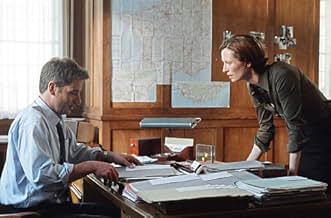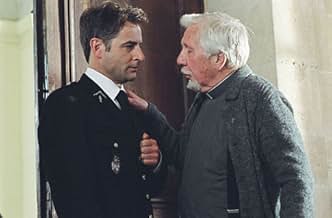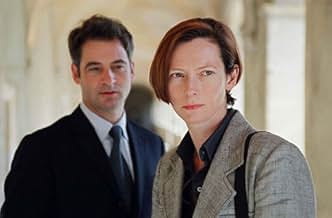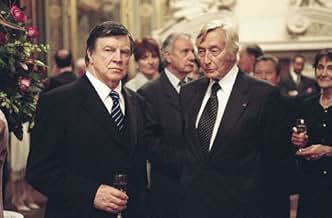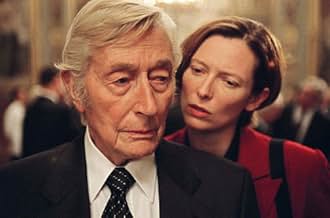IMDb RATING
6.2/10
5.7K
YOUR RATING
Tale of a former Nazi executioner who becomes a target of hitmen and police investigators.Tale of a former Nazi executioner who becomes a target of hitmen and police investigators.Tale of a former Nazi executioner who becomes a target of hitmen and police investigators.
- Awards
- 4 wins total
David de Keyser
- Dom André
- (as David De Keyser)
- Director
- Writers
- All cast & crew
- Production, box office & more at IMDbPro
Featured reviews
Your comments will be displayed as follows: A good adaptation of Brian Moore's thriller novel, director Norman Jewison's "The Statement" has its ups and downs.
Michael Caine, who has played many English roles as well as being an American abortion providing doctor, now takes on elderly Frenchman Pierre Brossard, once a shining star of the toady Vichy police force without which the Nazis could never have murdered some 77,000 French Jews. A small percentage of the Holocaust toll but not an unimportant one. Among other acts he participated in the roundup and murder of seven Jews. Such an incident was the basis for the novel.
A man who may belong to a Jewish revanchist organization is killed by Brossard before he can shoot the wheezing, cardiac condition-afflicted former right-hand helpmate for the SS. He's been sheltered for forty years by members of the Catholic clergy.
Tilda Swinton is Judge Levy assigned along with Jeremy Northam, a French army colonel, to find and bring Brossard to trial based on a new law reviving prosecutions against those who committed crimes against humanity. Actually, every important actor in this film except for Charlotte Rampling, who has a small role as Brossard's wife, is English. I'm surprised the French actors' union didn't raise a stink.
This is a chase film with Judge Levy and her colonel either warm or hot on the trail of Brossard who goes from monastery to monastery receiving food, money and help. (In France a judge has vast investigative authority and can and does direct inquiries so the director could credibly have Swinton going from city to city. Imagine Judge Judy flitting about in a chopper ferreting out facts.) At times I thought I was watching a travelogue about the abbeys of Gaul.
There are, of course, hints of a dark conspiracy reaching beyond the Church that I won't reveal.
Caine's peripatetic suspect is deeply religious in the formulaic sense that absolution and ritual salve his conscience but in no way mediate his actions. Caine plays a dirtbag to perfection.
Possibly to avoid charges that the film is unfairly anti-Catholic we're told that
1) the Church is vast, has many subordinate bodies, and those at the top just can't know all that is happening (this defense comes from a gentle librarian-Jesuit priest who also happens to be black, the predominant racial group in the French church).
2) responsibility for aiding genocide by clerics was individual so don't trot out any revisionist Hochhuth/Cornwell/Goldenhagen theories arraigning the Church's leadership.
3) we can't forget that the Resistance was largely communist so maybe there's a rational justification for Vichy's supine collaboration and the very real clerical support for the Nazis if not for every French assisted atrocity.
I despise the mindless Francophobic reaction to France's lack of support for U.S. policy on Iraq. But for too long Vichy and its spineless leaders, Petain and Laval, never mentioned in the film, have gotten a bit of a free ride. So I was happy to see Brossard made frightened as his pursuers close in.
Enjoyable, some nice scenery. Not much more except that Michael Caine is always terrific. And so is Tilda Swinton who brings focused intensity to Judge Levy's unyielding crusade for justice, for that it is.
6/10.
Michael Caine, who has played many English roles as well as being an American abortion providing doctor, now takes on elderly Frenchman Pierre Brossard, once a shining star of the toady Vichy police force without which the Nazis could never have murdered some 77,000 French Jews. A small percentage of the Holocaust toll but not an unimportant one. Among other acts he participated in the roundup and murder of seven Jews. Such an incident was the basis for the novel.
A man who may belong to a Jewish revanchist organization is killed by Brossard before he can shoot the wheezing, cardiac condition-afflicted former right-hand helpmate for the SS. He's been sheltered for forty years by members of the Catholic clergy.
Tilda Swinton is Judge Levy assigned along with Jeremy Northam, a French army colonel, to find and bring Brossard to trial based on a new law reviving prosecutions against those who committed crimes against humanity. Actually, every important actor in this film except for Charlotte Rampling, who has a small role as Brossard's wife, is English. I'm surprised the French actors' union didn't raise a stink.
This is a chase film with Judge Levy and her colonel either warm or hot on the trail of Brossard who goes from monastery to monastery receiving food, money and help. (In France a judge has vast investigative authority and can and does direct inquiries so the director could credibly have Swinton going from city to city. Imagine Judge Judy flitting about in a chopper ferreting out facts.) At times I thought I was watching a travelogue about the abbeys of Gaul.
There are, of course, hints of a dark conspiracy reaching beyond the Church that I won't reveal.
Caine's peripatetic suspect is deeply religious in the formulaic sense that absolution and ritual salve his conscience but in no way mediate his actions. Caine plays a dirtbag to perfection.
Possibly to avoid charges that the film is unfairly anti-Catholic we're told that
1) the Church is vast, has many subordinate bodies, and those at the top just can't know all that is happening (this defense comes from a gentle librarian-Jesuit priest who also happens to be black, the predominant racial group in the French church).
2) responsibility for aiding genocide by clerics was individual so don't trot out any revisionist Hochhuth/Cornwell/Goldenhagen theories arraigning the Church's leadership.
3) we can't forget that the Resistance was largely communist so maybe there's a rational justification for Vichy's supine collaboration and the very real clerical support for the Nazis if not for every French assisted atrocity.
I despise the mindless Francophobic reaction to France's lack of support for U.S. policy on Iraq. But for too long Vichy and its spineless leaders, Petain and Laval, never mentioned in the film, have gotten a bit of a free ride. So I was happy to see Brossard made frightened as his pursuers close in.
Enjoyable, some nice scenery. Not much more except that Michael Caine is always terrific. And so is Tilda Swinton who brings focused intensity to Judge Levy's unyielding crusade for justice, for that it is.
6/10.
After the Nazi's were driven out of France, those who had collaborated were mostly rounded up and punished many by death. However some escaped and were hidden, while others rose in power within the new regime. Pierre Brossard is one of the former and continues to live in fear, protected from those that would avenge his victims by his friends within the Catholic Church. However a close encounter shows that some group is closing in on him, meanwhile political pressure from Judge Livi and Colonel Roux's investigation into his whereabouts mean that he is quickly running out of friends willing to shelter him.
It is difficult to know how to approach this film because it itself doesn't seem too sure of what it is trying to do. Is it a drama looking at the idea of fleeing war criminals? Is it a chase movie? Is it a character piece looking at Brossard? It is never clear because it does do some elements of each but it doesn't really do anything that well and I, as a viewer, was a bit confused about what I was supposed to feel or think during it. The story itself is OK, reasonably engaging but not having anything of interest to it. As a chase film I was interested and the themes helped it seem more than the sum of its parts but not in reality. The motivations of the characters are never that well developed; the Livi/Roux parts are dull and quite routine although the sections with Brossard are more interesting.
It is a shame then that the film cannot decide what it wants to do with him do we feel for him, hate him or just watch him? The film doesn't let us decide this in a good way representing the complex nature of the character, but rather just doesn't push out any ideas one way or another. Caine does well despite this and gives a good character a bit of depth. He is where the film is although he probably benefits from the fact that everyone else is quite ordinary. Swinton and Northam are quite ordinary and their parts of the film just seem put of place and half-cooked. Support from Neville, Bates, Rampling and others just about do the job but add little.
Overall this is an OK film but nothing at all more than that. Despite the interesting and complex potential the film just delivers an ordinary chase movie and fails to do anything with the ideas and concepts inherent in it. Caine does well to produce quite a convincing character but he is alone in that, with the material and the rest of the cast failing to do anything that interesting. Not bad but not worth trying to find because it is nowhere near as good as one would have hoped.
It is difficult to know how to approach this film because it itself doesn't seem too sure of what it is trying to do. Is it a drama looking at the idea of fleeing war criminals? Is it a chase movie? Is it a character piece looking at Brossard? It is never clear because it does do some elements of each but it doesn't really do anything that well and I, as a viewer, was a bit confused about what I was supposed to feel or think during it. The story itself is OK, reasonably engaging but not having anything of interest to it. As a chase film I was interested and the themes helped it seem more than the sum of its parts but not in reality. The motivations of the characters are never that well developed; the Livi/Roux parts are dull and quite routine although the sections with Brossard are more interesting.
It is a shame then that the film cannot decide what it wants to do with him do we feel for him, hate him or just watch him? The film doesn't let us decide this in a good way representing the complex nature of the character, but rather just doesn't push out any ideas one way or another. Caine does well despite this and gives a good character a bit of depth. He is where the film is although he probably benefits from the fact that everyone else is quite ordinary. Swinton and Northam are quite ordinary and their parts of the film just seem put of place and half-cooked. Support from Neville, Bates, Rampling and others just about do the job but add little.
Overall this is an OK film but nothing at all more than that. Despite the interesting and complex potential the film just delivers an ordinary chase movie and fails to do anything with the ideas and concepts inherent in it. Caine does well to produce quite a convincing character but he is alone in that, with the material and the rest of the cast failing to do anything that interesting. Not bad but not worth trying to find because it is nowhere near as good as one would have hoped.
Pierre (Michael Caine) is a Nazi collaborator who has been in hiding for years. He was going to be executed for his deeds but had help escaping decades ago. Now, a judge and colonel are looking for him....as well as some Nazi hunters. But there are two things standing in their way...Pierre is a pretty deadly man and keeps killing Nazi hunters AND Pierre is still getting help from both members of the Catholic church AND government officials. Can they capture the man? And, can the judge and colonel get him to tell them WHO has been helping him?
Although Michael Caine is the star and he's good in the film, he's actually NOT featured all that prominently in the movie. Instead, it shows the various folks coming after him and explaining why...why folks would help a monster like him. Overall, it's a very interesting movie....with a tory that is quite satsifying. One complaint, however, is the lack of French actors in the film...and everyone is supposed to be French. Another is that the film is supposed to be set in the present day (2003) but I think it would have worked better having been set in the 1960s-80s. It's just hard to imagine a man as old a Pierre being such a tough character who's able to kill various Nazi hunters...it just didn't seem realistic as the crimes he committed occurred in 1944...and that would make his character about 80 (more or less) and I cannot imagine any 80 year-old being that dangerous when cornered.
Although Michael Caine is the star and he's good in the film, he's actually NOT featured all that prominently in the movie. Instead, it shows the various folks coming after him and explaining why...why folks would help a monster like him. Overall, it's a very interesting movie....with a tory that is quite satsifying. One complaint, however, is the lack of French actors in the film...and everyone is supposed to be French. Another is that the film is supposed to be set in the present day (2003) but I think it would have worked better having been set in the 1960s-80s. It's just hard to imagine a man as old a Pierre being such a tough character who's able to kill various Nazi hunters...it just didn't seem realistic as the crimes he committed occurred in 1944...and that would make his character about 80 (more or less) and I cannot imagine any 80 year-old being that dangerous when cornered.
In Norman Jewison's tepid thriller, `The Statement,' English-accented Michael Caine plays Pierre Brossard, an aging French war criminal whose past has begun to catch up with him. In 1944, Brossard, a member of the infamous Vichy regime, not only collaborated with the Nazis, but was personally responsible for the cold-blooded execution of 14 unarmed Jewish Frenchmen as well. Immediately after the war, Brossard was tried and convicted for these offenses, but somehow managed to escape before he could face his deserved punishment. In the years since, Brossard has lived his life underground, finding protection and sanctuary from a branch of the Roman Catholic Church sympathetic to his cause. And although the French authorities have been unsuccessful in their attempts to locate him, Brossard has recently found himself the target of a mysterious group of assassins, possibly members of a secret Jewish organization seeking justice for his yet unavenged crimes against humanity.
The idea of a Nazi war criminal still living in hiding all these years after the end of World War II has the makings of an interesting movie, no doubt, but `The Statement' is not that movie. To the filmmakers' credit, they do at least attempt to present Brossard as a three-dimensional character, a man who, decades after his horrendous crimes, is still seeking redemption through his pious devotion to the Church. Caine, in a deftly balanced performance, manages to make Brossard almost sympathetic while still allowing us to see the `monster' hidden beneath the ravaged soul. Unfortunately, the actor is let down by a screenplay that seems more concerned with tired cloak-and-dagger espionage routines than with a serious study of a fascinating and conflicted character. Even more annoying is the attempt on the part of the film to paint the entire Catholic Church hierarchy as a bunch of diabolical, self-serving individuals who are busy either protecting one of their own at any or all costs or acting out of political expediency rather than true moral conviction. Fans of `The Da Vinci Code' may swallow this anti-Catholic paranoia without question, but the rest of us can merely wonder why the Church hasn't been able to cop a break from the movies since Father Damien kicked the be-Jesus out of the devil in `The Exorcist,' thirty long years ago. I'm certainly no apologist for the Catholic Church (see my review of `The Magdalene Sisters'), but even we non-believers can wonder when we will be seeing a little more evenhandedness and balance in the movies' portrayal of the Church. Certainly there must be SOME well-meaning priest, nun or bishop out there that some filmmaker might consider as worthwhile movie material.
There are other problems with the film as well. Tilda Swinton, as an impassioned judge searching for Brossard, and Jeremy Northam, as a more pragmatic policeman who reluctantly joins her in her pursuit, make an annoying, constantly bickering couple who look, for all the world, like a minor-league Mulder and Scully, minus the attraction and charm. Alan Bates and Charlotte Rampling (reunited from `Georgy Girl,' though the two actors never appear in the same scene together) are wasted in minor roles. And Jewison, who was once so fine a young director, fails to bring any of the scenes in this film to life. One also questions the propriety of taking a serious subject like Nazi atrocities and using it as little more than cheap window dressing for an undistinguished, run-of-the-mill thriller.
`The Statement,' despite another fine performance from the ever-reliable Michael Caine, is a tired, lackluster and cynical exercise, strangely devoid of meaning, conviction and purpose.
The idea of a Nazi war criminal still living in hiding all these years after the end of World War II has the makings of an interesting movie, no doubt, but `The Statement' is not that movie. To the filmmakers' credit, they do at least attempt to present Brossard as a three-dimensional character, a man who, decades after his horrendous crimes, is still seeking redemption through his pious devotion to the Church. Caine, in a deftly balanced performance, manages to make Brossard almost sympathetic while still allowing us to see the `monster' hidden beneath the ravaged soul. Unfortunately, the actor is let down by a screenplay that seems more concerned with tired cloak-and-dagger espionage routines than with a serious study of a fascinating and conflicted character. Even more annoying is the attempt on the part of the film to paint the entire Catholic Church hierarchy as a bunch of diabolical, self-serving individuals who are busy either protecting one of their own at any or all costs or acting out of political expediency rather than true moral conviction. Fans of `The Da Vinci Code' may swallow this anti-Catholic paranoia without question, but the rest of us can merely wonder why the Church hasn't been able to cop a break from the movies since Father Damien kicked the be-Jesus out of the devil in `The Exorcist,' thirty long years ago. I'm certainly no apologist for the Catholic Church (see my review of `The Magdalene Sisters'), but even we non-believers can wonder when we will be seeing a little more evenhandedness and balance in the movies' portrayal of the Church. Certainly there must be SOME well-meaning priest, nun or bishop out there that some filmmaker might consider as worthwhile movie material.
There are other problems with the film as well. Tilda Swinton, as an impassioned judge searching for Brossard, and Jeremy Northam, as a more pragmatic policeman who reluctantly joins her in her pursuit, make an annoying, constantly bickering couple who look, for all the world, like a minor-league Mulder and Scully, minus the attraction and charm. Alan Bates and Charlotte Rampling (reunited from `Georgy Girl,' though the two actors never appear in the same scene together) are wasted in minor roles. And Jewison, who was once so fine a young director, fails to bring any of the scenes in this film to life. One also questions the propriety of taking a serious subject like Nazi atrocities and using it as little more than cheap window dressing for an undistinguished, run-of-the-mill thriller.
`The Statement,' despite another fine performance from the ever-reliable Michael Caine, is a tired, lackluster and cynical exercise, strangely devoid of meaning, conviction and purpose.
After France fell to Germany in 1940 , the Vichy regime was set up under Marshal Petain . In 1943 , the Vichy government created a military force called Milice to carry out the Nazi occupiers . When the war was over many of those involved were prosecuted for war crimes . Some get away . A few rose to power . Pierre Brossard ( Michael Caine ) committed crimes against humanity and collaborated with Nazis in WWII . Today Pierre follows hidden by priests of Catholic Church that sheltered him during fifty years and is being protected by a strange sect called The Chevaliers of St. Marie . But a judge ( Tilda Swinton ) and a colonel ( Jeremy Northam ) are investigating his past . Meanwhile , a mysterious murderous ( Matt Craven) is pursuing Pierre to kill him .
This TV movie produced by Canadian television in association with BBC packs suspense , mystery , thrills , action and is quite entertaining . Jewison cast some largely known actors as Michael Caine , his wife well played by Charlote Rampling , the starring duo as Tilda Swinton and Jeremy Northam , and a remarkable support cast as Ciaran Hinds as Inspector Pochon , Alan Bates as Bertier , Frank Finlay as the Comissaire and several others . Atmospheric musical score by Norman Corbeil and appropriate cinematography by Kevin Jewison , director's son . The motion picture is professionally produced and directed by Norman Jewison . He is a prestigious and veteran filmmaker, his greatest film is of course Jesus Christ Superstar . He considers The Hurricane (1999) the last in a trilogy of racial bigotry movies he's realized, the first two being In the Heat of the Night (1967) and A Soldier's Story (1984).
The film terminates with an epilogue based on real events , that says the following : ¨At 5:00 am , on June 29, 1944, in Rilleux -La-Pape, France, seven Jews were executed ¨. The movie is dedicated to those seven men and the 77.000 other French Jews who perished under German occupation and the Vichy regime .
This TV movie produced by Canadian television in association with BBC packs suspense , mystery , thrills , action and is quite entertaining . Jewison cast some largely known actors as Michael Caine , his wife well played by Charlote Rampling , the starring duo as Tilda Swinton and Jeremy Northam , and a remarkable support cast as Ciaran Hinds as Inspector Pochon , Alan Bates as Bertier , Frank Finlay as the Comissaire and several others . Atmospheric musical score by Norman Corbeil and appropriate cinematography by Kevin Jewison , director's son . The motion picture is professionally produced and directed by Norman Jewison . He is a prestigious and veteran filmmaker, his greatest film is of course Jesus Christ Superstar . He considers The Hurricane (1999) the last in a trilogy of racial bigotry movies he's realized, the first two being In the Heat of the Night (1967) and A Soldier's Story (1984).
The film terminates with an epilogue based on real events , that says the following : ¨At 5:00 am , on June 29, 1944, in Rilleux -La-Pape, France, seven Jews were executed ¨. The movie is dedicated to those seven men and the 77.000 other French Jews who perished under German occupation and the Vichy regime .
Did you know
- TriviaAs of April 2019, this is producer and director Norman Jewison's last movie.
- GoofsWhen Brossard searches the killer's wallet, we can see 500 francs banknotes with the head of Pierre and Marie Curie. This kind of banknote was released in 1994 and the action takes place in April 1992.
- Quotes
Pierre Brossard: Pray that we meet again... in this world.
- ConnectionsFeatures Only You (1994)
- SoundtracksLe Chemin des Forains
Music by Henri Sauguet
Lyrics by Jean Dréjac
Performed by Baguette Quartette
Published by G. Schirmer Inc., administered by Music Sales Corporation
Courtesy of Baguette Quartette
- How long is The Statement?Powered by Alexa
Details
- Release date
- Countries of origin
- Official site
- Languages
- Also known as
- The Statement
- Filming locations
- Production companies
- See more company credits at IMDbPro
Box office
- Budget
- $27,000,000 (estimated)
- Gross US & Canada
- $765,637
- Opening weekend US & Canada
- $37,220
- Dec 14, 2003
- Gross worldwide
- $1,079,822
- Runtime
- 1h 54m(114 min)
- Color
- Sound mix
- Aspect ratio
- 1.85 : 1
Contribute to this page
Suggest an edit or add missing content



